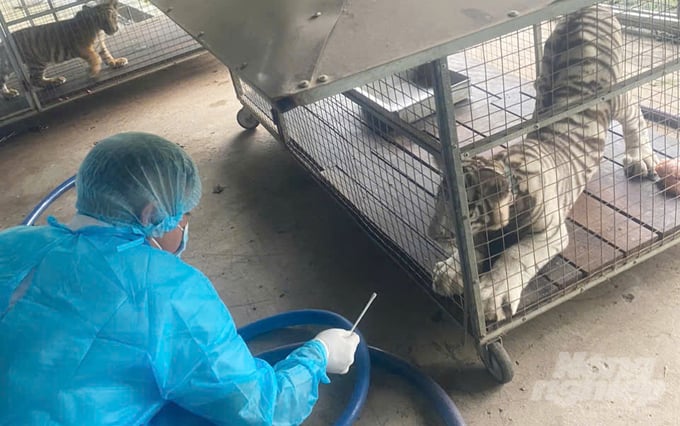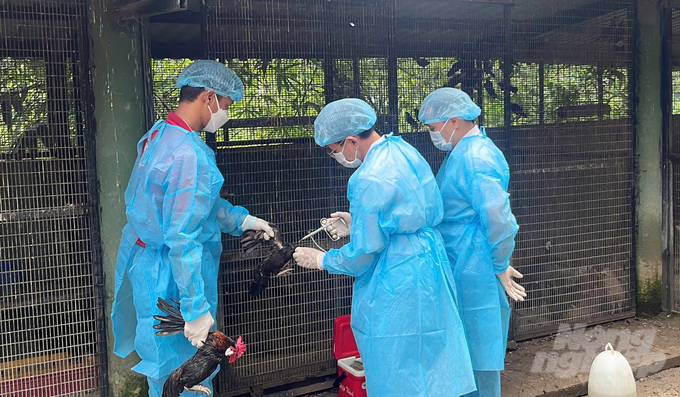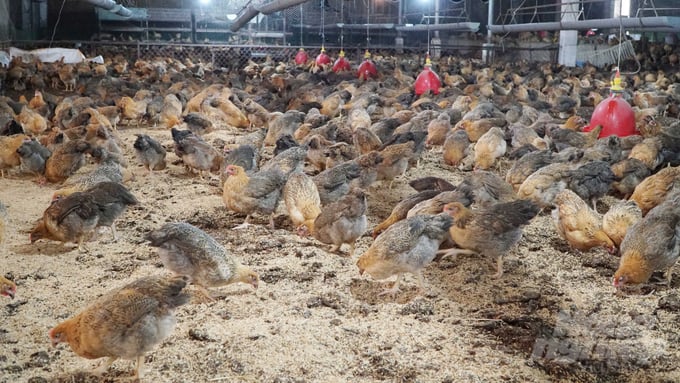November 27, 2025 | 09:17 GMT +7
November 27, 2025 | 09:17 GMT +7
Hotline: 0913.378.918
November 27, 2025 | 09:17 GMT +7
Hotline: 0913.378.918

The veterinary sector is closely monitoring the number of tigers and wild animals at the Mango Garden Ecotourism Area. Photo: Le Binh.
In response to the outbreak of avian influenza A/H5N1 in the locality, Dong Nai People's Committee issues an urgent document on the implementation of measures to prevent avian influenza A/H5N1 in livestock and wild animals.
Director of Dong Nai Department of Agriculture and Rural Development Nguyen Van Thang requests that Mango Garden Ecotourism Area limit visitors to the animal farm until the epidemic is over to prevent the risk of spreading A/H5N1 flu.
On the side of Mango Garden Ecotourism Area Company Limited, since the start of the disease outbreak, the management board and staff have well-implemented the recommendations of experts. The company has temporarily suspended all service activities. Wildlife caretakers are also fully equipped with protective gear to ensure they are not infected with the disease.
According to Luong Hai Phong, Deputy Head of the Disease Prevention Office, Dong Nai Sub-Department of Livestock Production and Animal Health, the province's method is to inspect, trace the source and thoroughly handle the disease at its root, but since 20 tigers and 1 leopard were discarded to stop the spread of A/H5N1 avian influenza, no additional cases of influenza infection have been confirmed.
“Although the most stressful time has passed, no wild animals at the Mango Garden Resort have shown signs of flu or other diseases, but we are still keeping a close watch on them. Upholding the spirit of not being negligent, we and the veterinary staff of the resort will be proactive in responding to any situation that may arise after this serious incident,” Luong Hai Phong said.

Dong Nai People's Committee requires localities to ensure a vaccination rate of over 80% for poultry flocks. Photo: Le Binh.
A working group from the Department of Animal Health recently went to the Mango Garden Ecotourism Area to collect fecal samples from wild animals for testing. The group also collected samples from communes in Trang Bom District, which are adjacent to the area where the A/H5N1 outbreak occurred. This is not only to isolate the disease area and trace the source of the epidemic but also to help Dong Nai's livestock avoid possible bad situations.
The total poultry flock in Dong Nai province is currently estimated at 30 million heads, including chickens, ducks, quails, pigeons, etc. These species are very susceptible to influenza A/H5N1. Nguyen Truong Giang, Head of Dong Nai Sub-Department of Livestock Production and Animal Health, speculates a serious risk of avian influenza in the province.

Having a large poultry population, Dong Nai needs to be more careful to trace and stop the source of the disease, otherwise the consequences will be unmeasurable. Photo: Le Binh.
Since the beginning of the year, the results of avian influenza surveillance at farms from 3,022 samples are all negative, including 1,128 samples for virus detection, 1,865 samples for antibody testing after vaccination, and 29 samples for antibody testing due to natural infection.
At this point in time, Dong Nai has nearly 400 farms certified as safe from avian influenza and Newcastle disease. Through clinical monitoring of the disease situation in the area from October 3, no new cases have been reported in wild animals and poultry.

Concentrated livestock farms and cooperatives in Dong Nai also need to be extremely careful about the health of poultry flocks. Photo: Le Binh.
Not only the functional sectors and specialized agencies are taking drastic measures to prevent bird flu, but cooperatives and people are also joining hands to control the epidemic. Le Van Quyet, Director of Long Thanh Phat High-Tech Agricultural Cooperative, said, “Although the cooperative's farms have complied with regulations on disease prevention, in this context, being a little more careful would not be redundant”.
“When investing in livestock farming, there must be facilities that ensure biosecurity, and breeds must be selected or purchased from reputable establishments that are controlled by the veterinary sector. During the farming process, farmers must report any changes in the herd or any unusual phenomena to the relevant authorities for timely intervention. Farmers must also vaccinate their livestock and poultry thoroughly”.
Translated by Samuel Pham

(VAN) Le Hoai Trung, Member of the Communist Party of Vietnam Central Committee and Minister of Foreign Affairs, held talks with Vi Thao, Chairman of the Guangxi Zhuang Autonomous Region (China) this week.

(VAN) The Mekong River Commission adopts the 2026 - 2030 Strategic Plan with a people-centered approach.
/2025/11/26/1720-1-200855_132.jpg)
(VAN) Viet Nam and Japan have many conditions to expand cooperation on climate change adaptation, particularly in disaster risk management based on advanced technologies.

(VAN) The strong development of digital technology and artificial intelligence is opening up opportunities to transform science and technology into a 'Magic eye' for disaster forecasting and early warning.

Applying vaccines and proactive disease prevention helps pig herds stay healthy, maintain productivity, reduce risks, and decrease reliance on antibiotics in modern livestock farming.

(VAN) Many advanced agricultural technologies and products were shared at the Viet Nam - South Korea Agricultural Technology Introduction, Trade Promotion, and Connection Seminar 2025.

(VAN) Minister Tran Duc Thang hopes to strengthen connections and exchanges with China in agriculture and environment sector through the Embassy of Vietnam in Beijing.